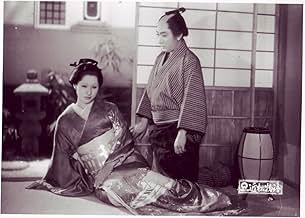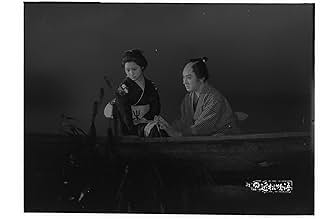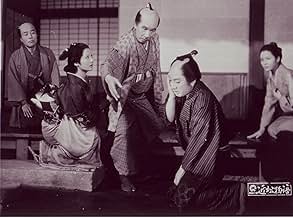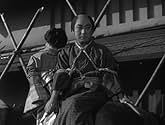PUNTUACIÓN EN IMDb
8,0/10
5,2 mil
TU PUNTUACIÓN
Ishun es un rico escribano que acusa falsamente a su esposa y su mejor empleado de tener una aventura.Ishun es un rico escribano que acusa falsamente a su esposa y su mejor empleado de tener una aventura.Ishun es un rico escribano que acusa falsamente a su esposa y su mejor empleado de tener una aventura.
- Dirección
- Guión
- Reparto principal
- Premios
- 1 premio y 2 nominaciones en total
Eitarô Ozawa
- Sukeemon
- (as Sakae Ozawa)
Reseñas destacadas
"Chikamatsu Monogatari" , (aka "The Crucified Lovers"), is one Mizoguchi's lesser known works and yet it is no less extraordinary for all that. It is, of course, typical of its director; another tragic tale of corrupted innocence and the terrible hand fate plays in people's lives, in this case a wrongful accusation of adultery over a very simple misunderstanding. Shakespeare could have written this.
It's set in the 17th century and it paints as relentless a picture of cruelty and hypocrisy as Mizoguchi has given us and he shoots it almost in semi-darkness, (even the exteriors take place at night or are shrouded in mist or in shadow), so there is no escape for its protagonists nor for us; the inevitability of the lovers' fate is clearly signposted from the beginning.
As the couple forced to acknowledge their love for each other by unfolding events Kazuo Hasegawa and Kyoko Kagawa are superb, particularly Kagawa whose performance as the wronged wife is a masterclass in subtlety and tenderness. This is surely one of the key films in all of Japanese cinema.
It's set in the 17th century and it paints as relentless a picture of cruelty and hypocrisy as Mizoguchi has given us and he shoots it almost in semi-darkness, (even the exteriors take place at night or are shrouded in mist or in shadow), so there is no escape for its protagonists nor for us; the inevitability of the lovers' fate is clearly signposted from the beginning.
As the couple forced to acknowledge their love for each other by unfolding events Kazuo Hasegawa and Kyoko Kagawa are superb, particularly Kagawa whose performance as the wronged wife is a masterclass in subtlety and tenderness. This is surely one of the key films in all of Japanese cinema.
This is adapted from a work by Chikamatsu Monzaemon, one of the defining writers from the early Tokugawa era. His name often reaches us in the contours of a Japanese Shakespeare and as usually with these Western imports to explain Eastern art, it is mostly a lazy comparison. Unlike Shakespeare who continues to inspire a steady flow of film, Chikamatsu's name has been largely neglected however; there is this, and films by Uchida, Shinoda, and Yasuzo Masumura, 'shunji'/double-suicide stories that were Chikamatsu's forte, each enlivened in its own way by the intensity of vibrant artifice and a story of forbidden passions cleansed by death.
So film-wise, the heart of these things has been extrapolated from where centuries of concentrated practice refined them, in the stages of kabuki or bunraku, both of which featured elaborate contraptions for generating illusions. The stage having been set, it was all a matter of achieving a cinematic mobility around it. Shinoda made the most clever simple use of that stage in Double Suicide; he was essentially filming what domestic audiences had enjoyed for centuries on the stage of bunraku as part of unbroken tradition, but trusting our eye to be naturally dislocated the right distance to absorb this as a puzzling modernity.
It is not unlike what has happened with Mizoguchi; a visual purity from tradition dislocated, thus obscured, through Western interpretations.
But let's backtrack a little. We know that Chikamatsu abandoned kabuki for the puppet theater of bunraku, an author's theater, with pliable actors held on strings and the gods that move the world made visible. There he worked in favour of better integrated audience manipulation, in favour of an idealized realism sprung from the author's mind.
So here we have a film about a scroll-maker, himself an artist charged with cultivating idealized images, fighting against the idealized reality he has helped cultivate in a quest for the true love he had all his life sublimated into perfect service.
It is very similar to Oharu in this way; the film structured around the tension that rises from characters performing idealized roles and the tortured heart that gives rise to them. There is a master printer who cultivates the image of the noble benefactor but who is a cruel deceiving scumbag. Nobles who act magnanimous in the open but then use their position to barter for money. The rival printer who feigns congratulations or compassion but who is secretly plotting for the imperial position.
So this idealized world that Chikamatsu advocated and in a small part helped cultivate, Mizoguchi posits to be a system of organized oppression with victims its own characters.
But it is in thrusting through this world of idealized, thus largely fictional appearances, that the two lovers can finally realize feelings that were socially prohibited. In this fictional world true beauty, a love fou, is realized by shedding the artificial. As it turns out, the two of them become the couple they were groomed to be.
As usual with Mizoguchi, the narrative on the surface level is never less than obvious. It is clean, disarmingly earnest. It seems like the film does not demand anything of us. But beneath the controlled histrionics, there is a heart of images that beats with abstract beauty.
The final image is of the two lovers publicly declaring love by simply standing together. It is again clean but resonates outsid the narrative. Their fate is sealed, but the image no longer cultivated but naturally arisen now has the chance to blossom across the audience of curious onlookers. It is an image with the power to inspire change.
Mizoguchi is not a filmmaker I can deem personal. But he's a remarkable study just the same.
So film-wise, the heart of these things has been extrapolated from where centuries of concentrated practice refined them, in the stages of kabuki or bunraku, both of which featured elaborate contraptions for generating illusions. The stage having been set, it was all a matter of achieving a cinematic mobility around it. Shinoda made the most clever simple use of that stage in Double Suicide; he was essentially filming what domestic audiences had enjoyed for centuries on the stage of bunraku as part of unbroken tradition, but trusting our eye to be naturally dislocated the right distance to absorb this as a puzzling modernity.
It is not unlike what has happened with Mizoguchi; a visual purity from tradition dislocated, thus obscured, through Western interpretations.
But let's backtrack a little. We know that Chikamatsu abandoned kabuki for the puppet theater of bunraku, an author's theater, with pliable actors held on strings and the gods that move the world made visible. There he worked in favour of better integrated audience manipulation, in favour of an idealized realism sprung from the author's mind.
So here we have a film about a scroll-maker, himself an artist charged with cultivating idealized images, fighting against the idealized reality he has helped cultivate in a quest for the true love he had all his life sublimated into perfect service.
It is very similar to Oharu in this way; the film structured around the tension that rises from characters performing idealized roles and the tortured heart that gives rise to them. There is a master printer who cultivates the image of the noble benefactor but who is a cruel deceiving scumbag. Nobles who act magnanimous in the open but then use their position to barter for money. The rival printer who feigns congratulations or compassion but who is secretly plotting for the imperial position.
So this idealized world that Chikamatsu advocated and in a small part helped cultivate, Mizoguchi posits to be a system of organized oppression with victims its own characters.
But it is in thrusting through this world of idealized, thus largely fictional appearances, that the two lovers can finally realize feelings that were socially prohibited. In this fictional world true beauty, a love fou, is realized by shedding the artificial. As it turns out, the two of them become the couple they were groomed to be.
As usual with Mizoguchi, the narrative on the surface level is never less than obvious. It is clean, disarmingly earnest. It seems like the film does not demand anything of us. But beneath the controlled histrionics, there is a heart of images that beats with abstract beauty.
The final image is of the two lovers publicly declaring love by simply standing together. It is again clean but resonates outsid the narrative. Their fate is sealed, but the image no longer cultivated but naturally arisen now has the chance to blossom across the audience of curious onlookers. It is an image with the power to inspire change.
Mizoguchi is not a filmmaker I can deem personal. But he's a remarkable study just the same.
This is certainly a good film, beautifully photographed and evocatively acted. Yet one should certainly criticize it, and Mizoguchi, for it is not without flaws and weaknesses. Mizoguchi really cared for women, and wanted to make statements on man's lack of sympathy and total cruelty, yet he sometimes gets ahead of himself in trying to make this statement by adopting the wrong means. This is certainly a case in 'the Crucified Lovers', 'Princess Yang Kwei Fei' and 'Zankiku monogatari'. He sets the scenario in feudal Japan, which leaves the viewer at the end with the partially right exclamation: "boy, does feudalism suck, I'm glad that it is over...". And true, some of the scenarios such weaker films of Mizoguchi present would be literary impossible today. Also, his women characters sometimes become archetypes of unrealistic self-sacrifice, which also simplifies the scenario less appealing. Saying that, "Crucified Lovers" is a good film, with such few relative weaknesses, though the sometimes chilly, cynical prose by Ueda, the screenwriter helps this film allot. I still highly prefer and recommend Mizoguchi's 'realistic, 'contemprary' films of 1936: 'Osaka Elegy' and 'Sisters of the Gion', as well as his late masterpieces, in which he showed more restraint and subtlety: 'Ugetsu', 'Sansho Dayu', and 'The Life of Oharu'.
"Chikamatsu Monogatari" (Crucified Lovers) (Japanese, 1954): Set in 17th century Japan, a series of honorable gestures begins to go terribly wrong, and takes victims with them. Did you know that adulterers at that time were crucified in Japan? This and many more traditions of the Old Way were up for reexamination by the Japanese culture soon after their defeat in World War II. This must have been a time of great doubt for them after all, wasn't it their past that lead them to their current condition? "Chikamatsu Monogatari" is an elegant, methodical story with tragic twists and turns that never the less head straight into inflexible Fate.
The only print of CHIKAMATUS MONOGATARI I've been able to find was abysmal - I almost couldn't watch it. Which is a shame as this is among the greatest Mizoguchi films. The story - which I believe had been done before and since by other Japanese directors - is a bit straighter than my favorite Mizoguchi films (SANSHO THE BAILIFF and UGETSU MONOGATARI), and is essentially a tale of tragic romance, in this case a transgressive romance that crosses strict class boundaries. As always with Mizoguchi, there is an exquisitely expressed tone of defiance, and - bad print aside - I was very pleased. As with all of Mizoguchi's films, I'm eagerly awaiting a restored DVD release - whenever that may come...
¿Sabías que...?
- CuriosidadesThe movie is based on a play by the classic Japanese author Monzaemon Chikamatsu (1653-1725). The original title "Chikamatsu monogatari" means "A Tale From Chikamatsu".
- ConexionesFeatured in Histoire(s) du cinéma: Toutes les histoires (1988)
Selecciones populares
Inicia sesión para calificar y añadir a tu lista para recibir recomendaciones personalizadas
- How long is A Story from Chikamatsu?Con tecnología de Alexa
Detalles
- Fecha de lanzamiento
- País de origen
- Idioma
- Títulos en diferentes países
- A Story from Chikamatsu
- Empresa productora
- Ver más compañías en los créditos en IMDbPro
Taquilla
- Recaudación en todo el mundo
- 9311 US$
- Duración1 hora 42 minutos
- Color
- Relación de aspecto
- 1.37 : 1
Contribuir a esta página
Sugerir un cambio o añadir el contenido que falta

Principal laguna de datos
By what name was Los amantes crucificados (1954) officially released in India in English?
Responde

















